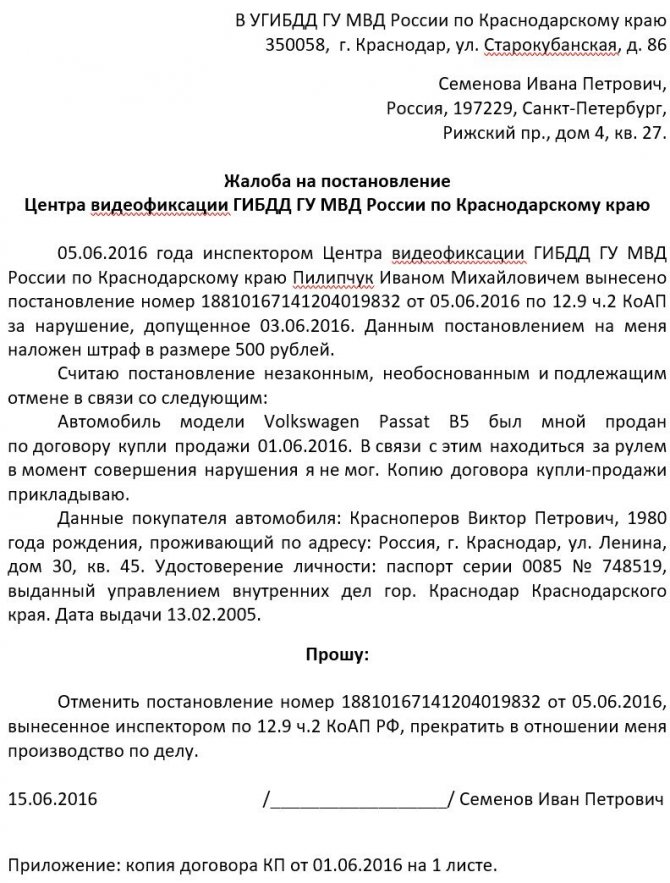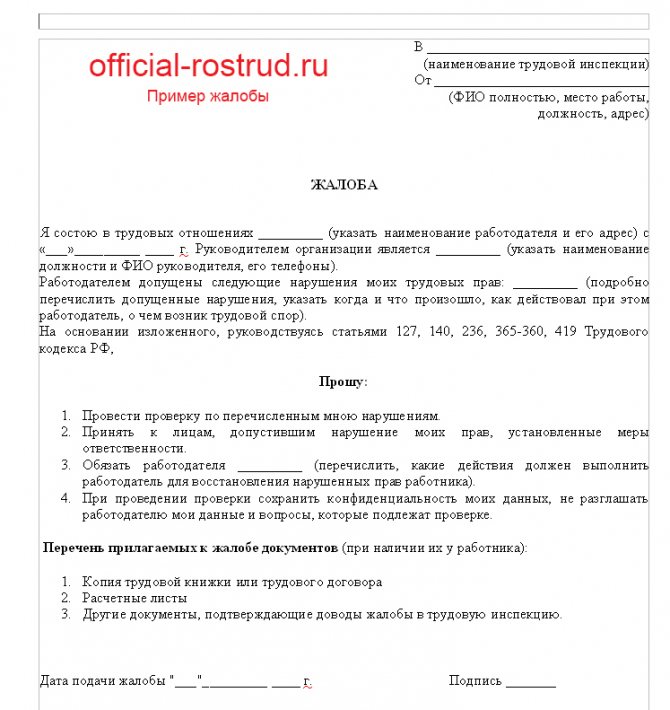Complaint against an employee: procedure for filing
The transfer of documents under such circumstances consists of the following steps:
- drawing up the complaint itself addressed to the manager;
- redirecting the message to labor inspectorate employees if no measures were taken the first time;
- appeal to the prosecutor's office, if no proceedings followed at the next stages. Or if the drafters believe that insufficient measures have been taken;
- document design, description of the standard structure.
So far, the Government has not developed a unified form for such requests. But there is information that must be present regardless of the reason.
Inspectors have the right to refuse to consider an application if errors were made during its execution.
The standard structure is described as follows:
- Signatures from each applicant.
- Date of registration.
- List of applications that are used as evidence.
- Specific employee requirements related to the need to resolve the conflict.
- The main part of the complaint is devoted to the circumstances surrounding the case. Be sure to write the full name of the manager with the organizational and legal form, the reason for the appeal and the offenses themselves that caused the conflict. Do not forget about the time when these violations were discovered.
- In the middle indicate the name of the document - “Complaint”.
- The header of the document is dedicated to the name of the managing company. Those persons on whose behalf the complaint is being submitted are separately mentioned.
The number of copies of the complaint is at least two. One of them is handed over to the regulatory authorities, the second copy remains with the employees who compiled the document.
Who can leave a note?
All organizations engaged in trade or customer service must have a book of reviews and suggestions (clause 8 of Resolution No. 55). The type of activity of the organization does not matter.
Every person who has visited a retail store or other establishment providing services can leave an entry in the complaint book with gratitude or negative feedback. He can do this regardless of whether he purchased any goods or not, since there is a possibility that the purchase did not take place precisely because of the presence of some negative factor (rudeness of the seller, expired goods, etc.).
The book of reviews and suggestions should always be issued to the consumer upon request.
How to act in the case when the seller refuses to provide a complaint book, coming up with a variety of excuses for its absence. In this case, the claim can be drawn up on a sheet of paper in 2 copies and require the seller to accept the appeal and put the appropriate acceptance mark on the copy, which remains in the applicant’s hands. If the parties cannot establish a dialogue, then the consumer has the right to contact the territorial department of Rospotrebnadzor.
Submission methods
You can choose any option that you find more convenient:
- Use email or feedback form.
- Services of a representative for whom an official power of attorney is issued.
- Sending registered letters, with notification of delivery and a list of attachments. Suitable for situations where employers refuse to accept documents voluntarily.
- Personal referral to representatives of the organization. Then be sure to receive a receipt confirming the sending of the message. A certified copy with an acceptance stamp also helps.
Where to file a claim?
Try to resolve the conflict yourself, reprimand the offender, have a conversation. If such actions have no effect, then you need to contact other authorities.
Complaint to management
You can submit a report to your supervisor if the offender is a work colleague. The rules for drawing up and submitting a memo are no different from writing other claims caused by a violation of work ethics.
The employer will study all the circumstances of the case, organize an internal inspection and, after it has been carried out, will decide on the type of disciplinary punishment.
Labour Inspectorate
If a conflict within an organization cannot be resolved, you should contact representatives of the law. A complaint against an employee is submitted to the Labor Inspectorate, after which its responsible employees organize an unscheduled inspection and prepare the evidence base.
Prosecutor's office
Art. 28.4 of the Code of Administrative Offenses indicates: the commencement of administrative proceedings under Article 5.61 is the area of responsibility of the prosecutor. It is necessary to file a statement about the fact of insult to the prosecutor's office and wait until the end of the investigation.
If the specified facts in the application are supported by evidence, the prosecutor will issue a decision to initiate administrative proceedings.
Class action
You can also contact the judicial authorities directly. In this case, we are no longer talking about a complaint, but about a statement of claim.
You can write such a paper collectively in the following cases:
- Sexual harassment of an employee (Article 133 of the Criminal Code of the Russian Federation).
- Public humiliation of honor and dignity (Article 5.61 of the Code of Administrative Offenses of the Russian Federation).
- Intentional actions of an employee that resulted in disciplinary action or dismissal.
Attention: An important part of the case is the evidence base. The outcome of the whole matter depends on her.
Acceptable time limits for responding to a complaint
The complaint is considered by government agencies within a month and after this time a response is given. The countdown begins from the moment it is accepted.
The written response will contain information about the work done and options for resolving the dispute, as well as the time frame within which these actions can be taken.
What penalties can be applied?
The culprit of the incident must suffer a well-deserved punishment in the form of administrative liability and a fine.
If the rules of conduct are prescribed in the company’s local regulations or in job descriptions, and the employee is familiar with them by signature, then you can apply:
- verbal remark;
- severe reprimand;
- deprivation of bonuses;
- termination of the employment agreement.
But for a violation a person can only be punished on one count.
Is it possible to fire an employee for rudeness?
An employee cannot be fired for rudeness and rudeness.
In accordance with current labor legislation, unethical behavior of an employee can be classified as:
- violation of the approved daily routine, work schedule (Article 81 of the Labor Code of the Russian Federation);
- neglect to fulfill the job description (Article 192 of the Labor Code of the Russian Federation).
You need to be extremely careful and follow the procedure for imposing disciplinary sanctions and the entire procedure for terminating a TD. Then the fired person will have no reason to go to court.
Conclusion
If unethical behavior is directed towards you, it is important to remain calm and take consistent steps to eliminate this manifestation - from indifference and avoiding common work with the offender to sending an appeal to higher authorities.
But this will not eradicate the problem of offensive communication in work collectives. To resolve it and prevent recurrence, it is necessary to systematically increase the level of culture of all employees.
Tags: complaint Statement
Penalties resulting from consideration of a complaint
Legislation determines the penalties that may be applied to subordinates. But economic entities have the right to establish specific types of impacts themselves.
The main thing is that the employees themselves are familiar with the acts drawn up by management. The main standards here are Articles 192 and 193 of the Labor Code of the Russian Federation.
The manager has the right to punish his subordinates as follows:
- verbal remark;
- termination of employment contracts;
- issuing a reprimand.
Who can complain
The Code of Civil Procedure of the Russian Federation states that any person who has suffered as a result of a violation of his legal rights, regardless of whether he is an individual or a legal entity, has the right to file an application with the judicial authorities.
Among the participants in the case, the following persons have the right to file a complaint with the court:
- plaintiff - a person who suffered as a result of an offense;
- defendant - a person who suffered as a result of a decision made in a trial against him or who was acquitted by the court (filing an appeal);
- representatives of both sides;
- an employee of the prosecutor's office who requests a review of a court decision.
Any person included in one of the listed categories of citizens has the right to complain to the court and demand the initiation of legal proceedings to protect their rights.
For example, if the plaintiff has objections due to the fact that, in his opinion, the court (district, arbitration, etc.) did not provide sufficient protection of rights and freedoms.
How to file a complaint against a manager
The form of the document in this case remains arbitrary. It is better to stick to a business style of address. Then there will be a greater chance of consideration and a positive response. It is necessary to ensure that the presentation of the circumstances of the case is specific and complete.
Typically, such messages contain the following information:
- Name of the organization to which the information is sent.
- Personal information associated with applicants. If the complaint is collective, then all representatives of the interested party are listed.
- Description of violations committed by management. It is mandatory to have references to legislative acts that are directly related to violations.
- Requirements put forward by the team. An example is paying off debts and conducting inspections, dismissing management, and so on.
- List of documents that became an attachment to the complaint.
- Date of compilation with personal signatures.
- Documentary evidence must be provided for each of the facts related to the behavior of management.
What does the review include?
The client can leave absolutely any entry in the book of reviews and suggestions at his discretion. But if the purpose of writing a review is to make some changes in the work of the organization and eliminate the cause of the complaint, then you will need to correctly state the appeal.
Structure
For the convenience of customers, some sellers place a sample review writing on the first pages of the book. This allows you to save time and not miss important points. The following information must be included in the review:
- Date of writing (day, month, year) and time.
- Full name and contact details of the consumer (telephone, postal address, email).
- Full name and position of an employee of the organization, if the action or inaction of a specific person became the basis for filing a complaint. This information is usually indicated on the employee's badge.
- A detailed description of the problem that has arisen, indicating the actions of each participant and links to legislation (if possible).
- Consumer requirements regarding changes in the current situation. It is necessary to indicate the time frame within which the organization’s management is obliged to take measures to solve the problem.
- Signature with transcript of the applicant.
Is it necessary to leave your contact information?
The law does not oblige the consumer to leave his contact information when writing a review, but this must be done if the applicant wants to receive a written response from the organization’s management to his complaint. The administration sends a response by registered mail to the address specified in the review.
In the absence of contact information, the consumer will not be able to receive an answer, nor will he be able to make a claim that management did not respond to his request.
Dismissal of a subordinate based on complaints from colleagues
Dismissal is an extreme measure of punishment, which involves certain actions:
- Receiving complaints from employees of the organization. It is necessary to study all the problems outlined in such a proposal.
- Then they clarify what legal grounds can be used for dismissal in this situation.
- A request is sent in which the employee is asked to draw up an explanatory note. Usually they give a maximum of two days to resolve issues.
- Next, they prepare an order for the employee’s dismissal and introduce the document to the subordinate himself. The citizen must sign.
Dismissal is permissible only in the presence of the following offenses:
- violation of internal company rules;
- non-compliance with the internal daily routine;
- refusal to perform duties.
Strained interpersonal relationships alone are not enough to make decisions related to dismissal.
Reasons for appeal
The city administration is authorized to resolve problems related to:
- with provision of the population with communal resources (electricity, water, and gas supply, heating);
- with the procedure for the use and disposal of municipal real estate (residential and non-residential), as well as their lease;
- with the arrangement of parking spaces and stops for public transport, as well as other issues related to road activities within the municipality;
- with the provision of social housing and other assistance for privileged categories of the population and citizens recognized as low-income;
- with the procedure for organizing landfills and garbage removal;
- with urban planning activities, registration of permits for development issues;
- with cleaning and landscaping work in parks and other objects that are municipal property, etc.
Attention! An exhaustive list of the powers of the administration is contained in Federal Law No. 13 of October 6, 2003. In addition, the activities of city administrations are regulated by regulations issued at the municipal level.
How to obtain permission to build a house on your own land in 2020, read here.
Drawing up reports on inappropriate behavior in the workplace
Internal conflicts and quarrels arise in the workplace quite often. Memos become one of the methods for resolving such a situation.
When drawing up a document, it is important to describe the situation itself and indicate exactly what actions are regarded as boorish, rude behavior towards others. It is imperative to have complete information about both the originator and the violator.

Documents are transmitted through secretaries or representatives of the personnel service. Don’t forget to register in the appropriate accounting journal.
Comment on the rating
Thank you, your rating has been taken into account. You can also leave a comment on your rating.
Is the sample document useful?
If the document “Sample.
“Complaint about unlawful actions of an official (government body)” was useful for you, we ask you to leave a review about it. Remember just 2 words:
Contract-Lawyer
And add Contract-Yurist.Ru to your bookmarks (Ctrl+D).
You will still need it!
Complaint against civil servants and officials
Many civil servants commit gross violations of the rights and interests of those who contact them. Moreover, they can use their position for personal gain. Therefore, the citizens themselves do not need to close their eyes.
Low pay and the level of qualifications of lower-level employees often lead to the fact that they themselves can be rude and rude, even insulting. But when entering such a service, everyone must study the so-called Code of Ethics related to behavior in different situations. Violations of the provisions of this Code shall result in more severe and stringent penalties than would otherwise apply.
In practice, other rights violations have become widespread:
- refusal to perform duties;
- illegal requirements for the provision of certain papers and information;
- rudeness, rude behavior;
- requirement to pay a fee, although the services provided do not require this;
- abuse of power.
Such actions are considered offenses, so citizens are allowed to contact the relevant higher authorities.
Sample complaint

Typical sample

2. No need to talk about all the hardships of life
Do not write a complaint on three pages. Any situation can be fit into one or two sheets. Even if there is a lot you want to say, remember that your request will be considered when it does not take a lot of time to read.
The complaint should contain only the bare facts of the case; you consider your circumstances from the point of view of an outside impartial observer. Imagine that you have been assigned to create a problem for a math textbook.
3. Abundance of references to regulations
But what you don’t need to skimp on when presenting the problem is listing the rules that protect your rights and justify further demands.
Here you can start directly with the provisions of the Constitution (Article 33 - the right to appeal, Chapter 2 - all human and civil rights). The main thing is that it must be appropriate and relevant.
In this way, firstly, you will reliably substantiate your position, and secondly, you will show that you are a literate and educated person. This is often a decisive factor in making decisions on complaints.
An example of a justified position in a complaint against a clinic
“In accordance with Art.
6 of the Law “On the Fundamentals of Protecting the Health of Citizens of the Russian Federation,” the priority of the patient’s interests in the provision of medical care is implemented, including taking into account the rational use of his time.
In accordance with Art.
10 of the Law, the availability and quality of medical care is ensured by the availability of the required number of medical workers and their level of qualifications.”
4. Pay special attention to the requirement
Most often, citizens modestly indicate one sentence in this paragraph, in the worst case, “I ask you to take appropriate measures.” What's bad about it?
Firstly, the authorities and officials will see that you are simply asking to “at least somehow react” and, perhaps, do not even know what specific result you expect.
Secondly, with a brief form of demand, you provide the addressee with the widest opportunities to choose how to respond. This can be done by simply informing a lower level official that “something needs to be done.” Same reaction? As you understand, your problem may never be solved in this way.










